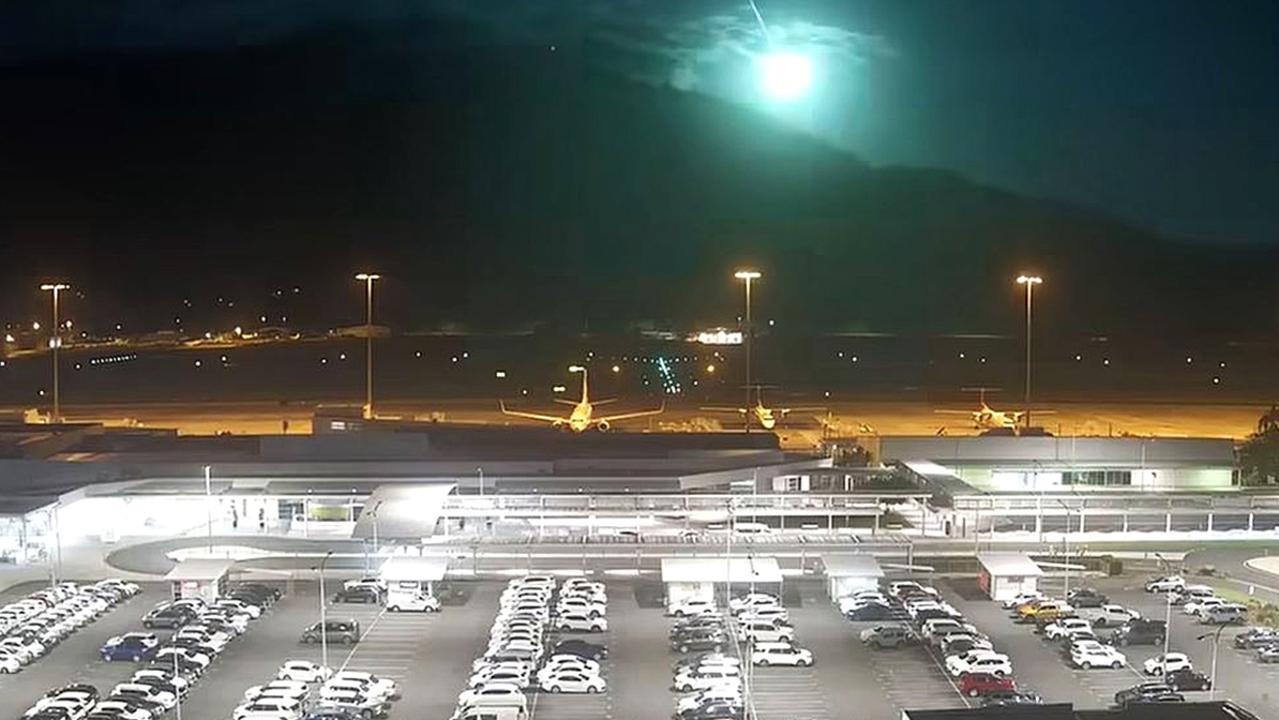Glowing meteor fireball lights up Queensland sky before crashing
A top scientist has confirmed it was a meteor that lit up the sky across far north Queensland before plummeting to the ground

READING LEVEL: GREEN
One of Australia’s top space scientists has confirmed a meteor* crashed in North Queensland at the weekend after reports of explosions, fireballs and a glowing green light in the sky.
People from across Queensland reported seeing a huge bright light flash in the sky with hundreds sharing videos, pictures and descriptions on social media.
Lilah Yoelu said she was travelling between Ayr and Townsville when she saw it.
“The light came out of nowhere and got brighter as it plummeted* straight down to the ground,” she wrote in a Facebook post. “The luminous* green and orange light lit up the sky. I was waiting for an explosion.”

Airlie Wenona Coleman also saw it but said it didn’t light up the sky.
“It was more like a huge flash towards Ingham way. It shocked all of us sitting around the fire too,” she wrote.
HOW DO WE KNOW IT WAS A METEOR?
Australian National University astrophysicist* and cosmologist* Dr Brad Tucker said it was “definitely a meteor” because of its unique look.
“Meteors have a characteristic* look. They’re a bright solid light and they often have this bluer-green colour.
“A large fraction of this meteor would have bits of iron and nickel in it, which is what causes it to glow that colour.”

He said based on the brightness, it was probably 50cm to 1m in size.
“It’s travelling tens of thousands of kilometres an hour, hits the Earth’s atmosphere*, causing it to burn and heat up, which is what people see.
“We also had the sonic boom*. That would’ve been it creating the shockwave and part of the meteor fragmenting — breaking apart — with potentially bits of the rock landing on the ground.”
He said Australia sees meteors like this one about once a month but mostly they land in areas without homes or in the ocean.
Keen astronomer* Ian Maclean believed the meteor fell near Croydon in far northwest Queensland where residents reported their entire homes shook.

WHY NO WARNING?
While many have described their excitement at the event, Queensland politician Robbie Katter was furious there hadn’t been any warnings for residents.
“When you’re talking about an event that was so significant that it shook the dust off the roofs of houses in Croydon and made every building in Croydon shiver, and was seen hundreds of kilometres away, that’s a significant meteorite,” he said.
“It’s hard to imagine that no one was observing that and it’s disappointing to know (that) if someone was observing that, no authorities gave anyone a heads up.”

GLOSSARY
- meteor: space rock
- plummeted: dropped very quickly
- luminous: glowing
- astrophysicist: scientist who studies our solar system, galaxies and planets
- cosmologist: someone who studies the universe and how it has changed
- characteristic: feature that makes a person or thing different from others
- atmosphere: the barrier of gases that surround our planet
- sonic boom: sound like an explosion caused by something travelling at very high speeds
- astronomer: someone who collects information about space, stars and planets
EXTRA READING
Possible meteorite crashes into family home
Aussie plan to beat Elon Musk’s rocket launch
Two-hour space flight from London to Sydney
QUICK QUIZ
1. Residents of which state in Australia witnessed the meteor?
2. How do experts know it was a meteor?
3. How fast does a meteor travel?
4. How often are they in Australian skies?
5. What size was this meteor estimated to be?
LISTEN TO THIS STORY
CLASSROOM ACTIVITIES
1. Meteors dropping
Why do you think these meteors tend to fall where there are no homes or in the ocean?
Work with a partner and brainstorm some potential hazards of these meteors if they are falling in populated areas:
—
—
—
—
—
Time: allow 20 minutes to complete this activity
Curriculum Links: English; Science; Personal and Social; Critical and Creative Thinking
2. Extension
Which authority should be in charge of tracking these types of meteors and how should they notify people if it’s a possibility of landing in a populated area?
Time: allow 15 minutes to complete this activity
Curriculum Links: English; Science; Critical and Creative Thinking
VCOP ACTIVITY
1. Wow Word recycle
Look at the glossary of high-level vocabulary. Pick four or five words to recycle and use in a new social media post from one of the witnesses.
What would you say if you were announcing to your social media friends or followers what you had just seen?
Include details about where you were, who you were with (if anyone), and what you were doing when the event occurred.
How will you use the high-level vocabulary in your post to make it all flow together?
Re-read your post before sharing it with a classmate. Make sure it makes sense, there are no omissions and the vocabulary words are used correctly.

